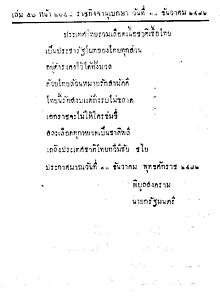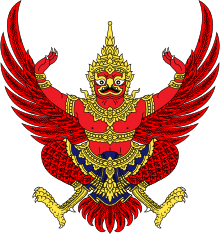Thai National Anthem
The Thai National Anthem (Thai: เพลงชาติไทย, romanized: Phleng chāt Thai) is the title of Thailand's national anthem which was adopted on 10 December 1939. The melody was composed by Phra Chenduriyang (Peter Veit) and the words are by Luang Saranupraphan. Phleng chāt (Thai: เพลงชาติ), literally meaning "national anthem", is a general term for a national anthem. This term is also used to refer to this specific song.
 Lyrics of the Thai national anthem, published in the Royal Thai Government Gazette on 10 December 1939. | |
National anthem of | |
| Lyrics | Luang Saranupraphan, 1939 |
|---|---|
| Music | Phra Chenduriyang, 1932 |
| Adopted | 1932 |
| Readopted | 1939 (with current lyrics) |
| Audio sample | |
"Thai National Anthem" (instrumental & vocal)
| |
Periodization
| Name | Date | Notes |
|---|---|---|
| Sansoen Phra Narai (Thai: สรรเสริญพระนารายณ์) (Glorify the King Narai) | 1687–1688 | Sri Ayutthaya (Thai: ศรีอยุธยา) Unofficial National Anthem in 1946–1949 |
| Chom Rat Chong Charoen (Thai: จอมราชจงเจริญ) (Long Live the Great King) | 1855–1871 | Siamese Rattanakosin period royal anthem and national anthem, introduced by King Mongkut (used the melody of God Save the King) |
| Bulan Loi Luean (Thai: บุหลันลอยเลื่อน) (The Floating Moon On the Sky) | 1871–1888 | which was the royal composition of King Buddha Loetla Nabhalai (Rama II) for use as the new anthem. King Chulalongkorn later ordered Mr.Heutsen, a Dutch bandmaster who served in the Royal Siamese Army, to arrange the song in western style for performing by the military band. According to a research of Sugree Charoensuk, an associate professor from Mahidol University, the melody of this anthem may be the same tune with another anthem named Sansoen Suea Pa (Thai: เพลงสรรเสริญเสือป่า : Tiger Corps Hymn) which was used as the anthem of the Wild Tiger Corps since 1911.[1] |
| Sansoen Phra Barami (Thai: สรรเสริญพระบารมี) (Glorify His Prestige) | 1888–1932 Royal anthem since 1932 | Rattanakosin period national anthem |
| Maha Chai (Thai: มหาชัย) (Grand Victory) | 1895 Provisional National Anthem in 1932 | Other members of the royal family and colours party of the unit colour in slow march |
| Phleng Maha Nimit (Thai: ตระนิมิตร / มหานิมิตร) (Grand Vision) | 1934 | |
| Phleng Chat Siam Phleng Chat Thai (Thai: เพลงชาติสยาม / เพลงชาติไทย) | 1932–1946 1949–present | After Siamese revolution of 1932, the anthem was classified into 2 factions, Phleng Chat Thai was used as national anthem and Sansoen Phra Barami was still used as royal anthem. In 1939 the country's name was changed from Siam to Thailand and the anthem's lyrics was changed from the words Siam to Thai. |
Historical background
National Anthem before 1932
Before 1932, Sansoen Phra Barami (the Royal Anthem) was used as the national anthem of Siam.
National Anthem after 1932
_1933.jpg)
The anthem was composed a few days after the revolution of 1932 in the tune vaguely similar to the national anthem of Poland, Poland Is Not Yet Lost, and was first broadcast in July 1932. The original lyrics were by Khun Wichitmatra.
Phleng Chat Siam (Khun Wichatmatra lyrics, 1932–34)
Khun Wichatmatra lyrics |
Romanisation |
Phonetic transcription (IPA) |
English translation |
แผ่นดินสยามนามประเทืองว่าเมืองทอง |
Phǣndin sayām nām prathư̄ang wā mư̄ang thǭng |
Siamese land is renowned as the land of gold. |
First national anthem competition (1934)
In 1934, Thai government launched competitions for the official national anthem, for both melody and lyrics. Jangwang Tua Patayakosol composed a tune in a traditional style called "Phleng Maha Nimit", but Phra Jenduriyang's melody was selected because it sounded more modern.
Second National anthem competition
After that, in the competition for the lyrics with Phra Jenduriyang's music, the original words by Khun Wichitmatra took first prize. They were in use until 1939, with a minor edit and an additional version written by second prize winner Chan Khamvilai (ฉันท์ ขำวิไล) adopted in 1934.[6][7][8]
Phleng Chat Siam (Chan Khamvilai lyrics, 1934–39)
Chan Khamvilai lyrics |
Romanisation |
Phonetic transcription (IPA) |
English translation |
เหล่าเราทั้งหลายขอน้อมกายถวายชีวิต |
Lao rao thang lāi khǭ nǭm kāi thawāi chīwit |
Thai Cultural revolution
In 1939, when the name of the country was changed from Siam to Thailand, a competition was launched to create new lyrics, with those by Luang Saranupraphan winning. Thai Prime Minister Plaek Phibunsongkhram ordered the anthem to be played every day at 08:00 and 18:00 (8 AM and 6 PM), and ordered the populace to stand up to show respect for the nation. Nowadays, the morning and evening anthems correspond to the hoisting and lowering of the national flags in public areas (e.g. schools, workplaces, public buildings), respectively; hence, the anthem is broadcast by both radio and television channels twice per day.
Current lyrics
Thai |
Romanisation |
Phonetic transcription (IPA) |
English translation |
ประเทศไทยรวมเลือดเนื้อชาติเชื้อไทย |
Prathēt thai rūam lư̄at nư̄a chāt chư̄a thai |
[pràtʰêːt̚ tʰaj ruːə̯m lɯ̂ːə̯t̚ nɯ́ːə̯ tɕʰâːt̚ tɕʰɯ́ːə̯ tʰaj] |
Thailand unites the flesh and blood of Thais. |
.jpg)
See also
- Sansoen Phra Barami (Thai national anthem before 1932, still used as the royal anthem)
- Thaification
Notes
- This part of the lyric, as officially published in the Royal Thai Government Gazette, volume 51, section 0 ง, dated 26 August 1934, was printed as "แม้ถึงไทยไทยด้อยจนย่อยยับ". This differs from the original handwritten lyrics by Chan Khamvilai, "แม้ถึงภัยไทยด้อยจนย่อยยับ", leading to a confused meaning. Because of this, the article uses the original lyric as written by Chan Khamvilai instead of the version published in the gazette (See Jeamteerasakul, Somsak. ความเป็นมาของเพลงชาติไทยปัจจุบัน. pp. 45-46)
References
- Charoensook, Sugree (2016-11-07). "128 ปี เพลงสรรเสริญพระบารมี : สรรเสริญพระบารมีพระมหากษัตริย์ทุกพระองค์ โดยสุกรี เจริญสุข". Matichon Online. Retrieved 2019-10-12.
- เนื้อร้องฉบับต้องห้าม บทที่ 2 วรรคที่ 3 เอกราษฎร์คือกระดูกที่เราบูชา ที่ขุนวิจิตรมาตราประพันธ์เริ่มแรกสุดแต่ไม่เป็นทางการ (ต่อมาแก้ไขเนื้อร้องเพิ่มเติม ก่อนที่คณะรัฐมนตรี ได้ประกาศรับรองให้เป็นบทร้องเพลงชาติฉบับราชการ เมื่อวันที่ 20 สิงหาคม พ.ศ. 2477).
- เนื้อร้องฉบับต้องห้าม บทที่ 2 วรรคที่ 5 ยึดอำนาจกุมสิทธิ์อิสสระเสรี ที่ขุนวิจิตรมาตราประพันธ์เริ่มแรกสุดแต่ไม่เป็นทางการ (ต่อมาแก้ไขเนื้อร้องเพิ่มเติม ก่อนที่คณะรัฐมนตรี ได้ประกาศรับรองให้เป็นบทร้องเพลงชาติฉบับราชการ เมื่อวันที่ 20 สิงหาคม พ.ศ. 2477).
- The original lyrics contained the line Independent is ashes and relics to respect (with a minor edit before official broadcast in 20 August 1934).
- The original lyrics contained the line That's why we stand, for freedom regime (with a minor edit before official broadcast in 20 August 1934).
- Jeamteerasakul, Somsak (December 2004). "ความเป็นมาของเพลงชาติไทยปัจจุบัน". Thammasat University Journal (in Thai). 27 (1). Archived from the original on 2019-10-17. Retrieved 2019-10-17.
- "เพลงชาติ". www.banfun.com (in Thai). Archived from the original on 2007-10-11.
- History of Thai National anthem from Rakbankerd.com (in Thai)
- https://www.loc.gov/catdir/cpso/romanization/thai.pdf The transliteration system used here is a slightly modified version of ALA-LC (which itself is based on RTGS 1939); the differences being that č and ‘ are absent in the transliteration provided below.
External links
| Wikisource has original text related to this article: |
| Thai Wikisource has original text related to this article: |
- Recordings of the National and Royal Anthem of Thailand and others honor musics from Thai Government Public Relations Department
- Thailand: Phleng Chat Thai - Audio of the national anthem of Thailand, with information and lyrics
- เพลงชาติไทย (Thai National Anthem)
- Thailand National Anthem (MCOT 2009 - 2011) on YouTube (in Thai)
- English lyrics to the Thai National Anthem
- A website dedicated to information on Thai National Anthem (Thai Language)
